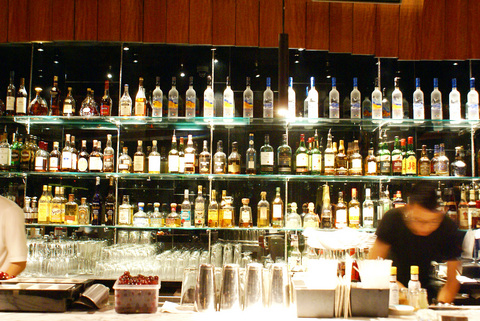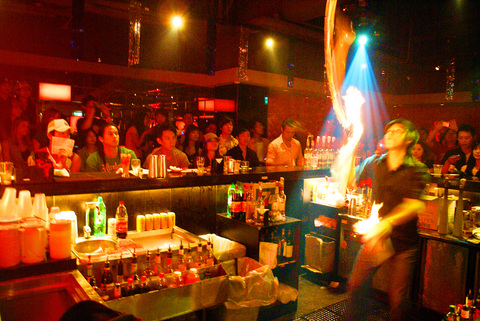South Korean student Jin Ying-shi, 24, takes a swig from his beer, his third of the evening, as he looks around at the crowd of revelers.
Jin is at Club Wax, a subterranean bar on Roosevelt Road, taking advantage of the all-you-can-drink special of NT$350, a price NT$150 cheaper than the Taiwanese patrons, though NT$250 more than the barely clad women.
"I come her for the cheap drinks," said Jin taking another slug from the bottle of beer. "And on nights like tonight, foreigners get in for cheaper [than Taiwanese men] as well."

PHOTO: NOAH BUCHAN, TAIPEI TIMES
Jin is taking advantage of a trend that has taken over Taiwan's clubbing scene 〞 especially in the Shida and Gongguan districts of Taipei. Home to two of Taiwan's largest public universities and a host of private colleges, the area boasts a huge student population that has extra cash in their pockets and the freedom for many that accompanies living away from the scrutiny of parents.
"There's no way I could do this if I were living at home," said Francesca, nursing a rum and coke at Club 9%, another club offering all you can drink specials. The 22-year old National Taiwan Normal University student from Chiayi didn't want her surname printed for fear that her parents might see her name in the paper.
"I'd have to be home earlier and there's no way I could drink," she said. Francesca says she goes to Club 9% once a month with friends and avoids other bars because "the drinks are too expensive."

PHOTO: NOAH BUCHAN, TAIPEI TIMES
With a NT$500 cover charge, Club Wax and Club 9% are cashing in on a generation of clubbers who are unwilling to pay NT$150 to NT$200 for a drink, the average price for a cocktail or beer.
"It's simple math," said Jason Hu (綸褫?), a 21-year old engineering major. "Why would I pay NT$150 per drink when I can spend NT$500 and drink for the whole night."
Sylvia Hu (綸衱恅), project planner for Full-More Business Management, the company that runs Club 9%, said Club VS was the first to start the all you can drink phenomena four years ago. "We thought we would try it out as a kind of test and because it was so popular with customers we decided to keep it," she said.
With the all-you-can-drink clubs has come bouncers, the tall and mean-looking security standing at the doors. But Hu says that bouncers are generally not necessary because fights rarely occur, even after people are drunk.
"If a fight occurs, we just call the police or have their friends break it up," she said.
Asked if clubs and bars in South Korea offer the same specials as Taiwan, Jin laughs.
"They"d go out of business in a week," he scoffed.
South Korea? hard-hitting drink culture couldn"t provide more of a contrast to Taiwan, he said.
"University students in Korea can be found staggering on the trains at night or passed out on park benches," he said. "I"ve never seen this happen in Taipei."
Indeed, compared to neighbors South Korea and Japan, Taiwan is not known for it? drinking culture, which may be how these all-you-can-drink establishments survive.
Hu said the profit margins on alcohol at regular bars are such that providing all-you-can-drink deals is not a concern. Club 9% is also part of a larger company that operates Club VS and several other establishments. The quantity of alcohol ordered by these bars makes the per-unit price negligible.
"Besides," she said, "most people -- especially women -- will have at most three or four drinks."
Similar to Club 9%, Club Wax offers all-you-can-drink specials from Wednesday to Sunday. Club Wax is also part of a larger company of bars that includes TU, Party Room and the temporarily closed B1 -- all of which offer all-you-can-drink nights -- as well as the high end clubs Plush and Mint.
Chen Hsiu-yu (陳糸秀毓), assistant manager at Club Wax -- who, like Club 9%? Hu, claims that the company she works for started the all-you-can-drink trend four years ago -- says that the drinks aren"t the only thing that brings the customers in.
"Music is important," she said. "If the music is bad, the customers won"t come. I won"t say our music is the best but we do play the latest music."
"But also the all-you-can-drink [offer] is also important, as well as the service," she added.
With this many clubs offering all-you-can-drink, managers are constantly finding new ways to bring in the crowds. In addition to the drink specials, Club Wax offers a monthly "Beach Party" that features young women gyrating to hip hop music while splashing around in small pools of ice water. Some have even been known to remove their tops.
Going upscale
Across town at Barcode, the vibe is completely different. With Nina Simone tunes emanating from the sound box the atmosphere is low-key and relaxed. The clientele are ten years older and a few digits wealthier. The space is an upscale lounge bar run by Matt Chang (張均豪).
"Barcode is different from other bars because we [have] different cocktails. You can drink a bottle of single-malt everywhere, but you can"t drink the same cocktails," he said.
Known for their creative potions that emphasize fresh ingredients, the price for some cocktails at Barcode are as much as the entrance for some all-you-can-drink clubs.
Restaurants are even jumping on the all-you-can-drink bandwagon.
Simmer Liu (劉桐榮), owner of Belly Wash, a newly opened restaurant will begin an all-you-can-drink cover charge -- NT$250 for ladies and NT$500 for men -- on weekends within the next month.
"It? the trend for most bars in Taipei. It? because people in Taiwan prefer this kind of deal," he said when asked why he's going to begin the specials. "It? more economical," he added.
WARNING: Excessive consumption of alcohol can damage your health.

May 11 to May 18 The original Taichung Railway Station was long thought to have been completely razed. Opening on May 15, 1905, the one-story wooden structure soon outgrew its purpose and was replaced in 1917 by a grandiose, Western-style station. During construction on the third-generation station in 2017, workers discovered the service pit for the original station’s locomotive depot. A year later, a small wooden building on site was determined by historians to be the first stationmaster’s office, built around 1908. With these findings, the Taichung Railway Station Cultural Park now boasts that it has

Wooden houses wedged between concrete, crumbling brick facades with roofs gaping to the sky, and tiled art deco buildings down narrow alleyways: Taichung Central District’s (中區) aging architecture reveals both the allure and reality of the old downtown. From Indigenous settlement to capital under Qing Dynasty rule through to Japanese colonization, Taichung’s Central District holds a long and layered history. The bygone beauty of its streets once earned it the nickname “Little Kyoto.” Since the late eighties, however, the shifting of economic and government centers westward signaled a gradual decline in the area’s evolving fortunes. With the regeneration of the once

In February of this year the Taipei Times reported on the visit of Lienchiang County Commissioner Wang Chung-ming (王忠銘) of the Chinese Nationalist Party (KMT) and a delegation to a lantern festival in Fuzhou’s Mawei District in Fujian Province. “Today, Mawei and Matsu jointly marked the lantern festival,” Wang was quoted as saying, adding that both sides “being of one people,” is a cause for joy. Wang was passing around a common claim of officials of the People’s Republic of China (PRC) and the PRC’s allies and supporters in Taiwan — KMT and the Taiwan People’s Party — and elsewhere: Taiwan and

Even by the standards of Ukraine’s International Legion, which comprises volunteers from over 55 countries, Han has an unusual backstory. Born in Taichung, he grew up in Costa Rica — then one of Taiwan’s diplomatic allies — where a relative worked for the embassy. After attending an American international high school in San Jose, Costa Rica’s capital, Han — who prefers to use only his given name for OPSEC (operations security) reasons — moved to the US in his teens. He attended Penn State University before returning to Taiwan to work in the semiconductor industry in Kaohsiung, where he